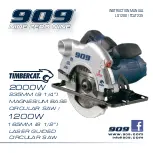
--- 27 ---
In the cutting examples illustrated in Fig. 37, the cut surfaces on the sides marked (cut with the grain) are
better than those on the sides marked .
(8) Cut surface quality during miter/bevel cutting
The quality of the cut surface depends on the type
of cutting operation (miter or bevel), the type and
sharpness of the saw blade, whether the workpiece
is cut to the left or right, and various other factors.
In miter and bevel cutting in particular, cutting is
performed across the wood grain, so the condition
of the cut surface depends on whether the wood is
cut with or against the grain. This is the same as
when using electric portable planers. Customers
should be advised of these phenomena so that they
understand that in cases when the cut surface may
not be as smooth as expected or hoped for, it is not
caused by the performance of the saw blade or the
Models C 10FSH/C 10FSB.
Fig. 37
[Miter cutting]
[Left bevel cutting]
[Right bevel cutting]
A
B
A
B
A
A
A
B
B
B
(9) Crown molding cutting
This machine can cut two types of crown molding workpieces by combining the miter and bevel cutting
operations.
Fig. 38 shows two common crown molding types having angles of (
θ
) 38˚ and 45˚. For the typical crown
molding fittings, see Fig. 39.
Fig. 38
Fig. 39
Ceiling
B Lower surface
A Upper surface ceiling
Wall
Wall
The table below shows the miter angle and the bevel angle settings that are ideal for the two crown molding
types.
NOTE: For convenience, positive stops are provided for both the miter setting and the bevel setting (left and
right 31.6˚) positions. (For USA/CAN)
2
1
Inside corner
Outside corner
(7) Compound (miter + left bevel) cutting
Compound (miter + left bevel) cutting can be accomplished by combining the miter cutting and left bevel
cutting operations described in paragraphs (5) and (6) above. (For details, refer to the Instruction Manual
"Compound cutting procedures".) When the saw blade is inclined 45˚ to the left, the turn table can be turned
up to 45˚ to the left and right. When the saw blade is inclined 45˚ to the right, the turn table can be turned up
to 31˚ to the left, and up to 45˚ to the right because the 6-mm knob bolt (for securing the guard) contacts
fence (A).
θ
˚
3
4
















































